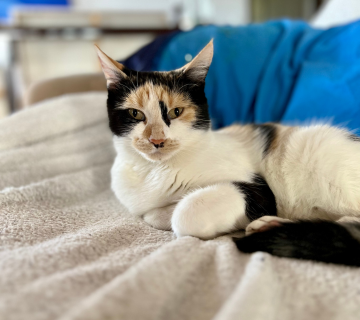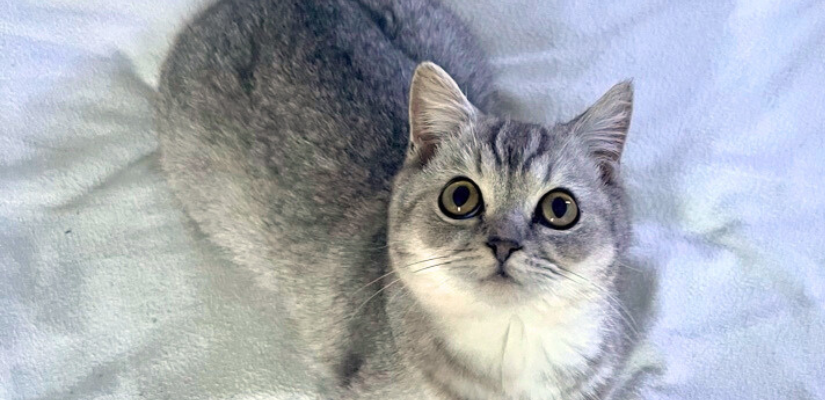Cats have always intrigued humans with their enigmatic nature. We domesticated them centuries ago and they became our beloved companions who now laze around our homes, eat our food, and can be very cuddly and playful. But many people ask “Does my cat love me”?
But while we adore our felines, do they feel anything for us, or is their ‘affection’ simply a mix of instinct and a desire to be homed and fed? Do they truly know us, and miss us when we’re away?
Let’s do a deep dive into decoding their expressions of love. In this article, we’ll explore the multifaceted relationships cats share with their human companions and the various ways they communicate their love.
So, do our cats actually love us, or are they only faking affection to get food?
Cats’ Complex Relationships with Humans
Before we dive into understanding how cats express love, let’s acknowledge the intricate relationships they cultivate with their human guardians. These relationships are influenced by various factors that play pivotal roles: the type of cat, their upbringing, early socialisation, and the owner’s behaviour.
Some cats are naturally more independent, while others are incredibly affectionate. Therefore, the depth of a cat’s connection with their owner can vary widely. Whether your feline friend is an aloof observer or a constant companion, it’s essential to appreciate the unique and complex relationships that cats offer. Love doesn’t always look the same, but that doesn’t mean it isn’t there.
Each cat has a unique personality and will express love differently. Some cats are clearly attached to their owners, seeking constant attention, cuddles, and physical closeness. In contrast, other cats may prefer to express their love through more subtle behaviours, such as sitting nearby to you or bringing you “gifts”. More playful cats might demonstrate love with interactive engagement and always want you to play with them. Recognising and appreciating your cat’s individuality is essential.
How Cats Show Love
Cats employ a range of behaviours to communicate their affection. Purring, kneading, grooming, and cuddling are some of the most common signs of a cat’s love. These gestures, while endearing, have roots in the cat’s evolutionary history. For instance, kneading originates from kittenhood when cats knead their mother’s belly to stimulate milk flow. Understanding the significance of these behaviours can provide insights into the depth of your cat’s love.
Cats are masters of non-verbal communication, and their body language and vocalisations can offer a window into their emotional states. Understanding these cues can help you decipher your cat’s affection. Purring, for instance, is a universally recognised sign of contentment. A cat that purrs in your presence is likely expressing their love and trust. Other cues, like the slow blink, indicate relaxation and affection. Paying close attention to your cat’s signals is key to understanding their emotions and the depth of their attachment.
The Science Behind Cat Affection
The science behind cat affection is fascinating. Cats can form strong emotional bonds with their owners, thanks to hormones and neurotransmitters like oxytocin, also known as the “love hormone.” The same hormone that deepens the bond between humans can also work its magic between cats and their guardians. This chemical reaction plays a significant role in strengthening the emotional connection and is a testament to the love cats can feel.
So, the science says “yes!”, our cats really do love us.
Encouraging Your Cat to Be More Affectionate
Strengthening the bond with your cat involves creating a nurturing and interactive environment. Offering enrichment activities, engaging in interactive play, and providing a safe space for your cat can promote trust and love. Spending quality time with your feline companion can help nurture their affection and deepen your connection.
Still, it’s important to remember that all cats are different, and you can’t force affection. If you show them love in a way that suits them, they’ll show their love for you in their own way.
Love vs. Comfort & Food
So, we’ve arrived at the question we’re bursting to know the answer to: do cats love us or our food-giving abilities?
The distinction between a cat seeking comfort, sustenance, and genuine affection can sometimes blur. Cats are known for their independence, but they can also appear aloof or fickle, leading to misconceptions. Some cats are simply more pragmatic, seeking your attention for a meal or a warm spot to rest.
It’s important to recognise that a cat’s behaviour can be influenced by their immediate needs, not just their affection level. The expectation of clear-cut displays of love can sometimes lead to misunderstandings.
But, as we’ve seen, regardless of how much our cats depend on us and might show extra affection in order to get food, they do truly love us – even if it’s deep down!
Cats may not declare their love as humans do, but their unique expressions of affection are unmistakable once you learn to decipher them. The complex relationships they form are a testament to the emotional depth of these mysterious creatures.
By observing your cat’s behaviours, reading their cues, and providing an enriched and secure environment, you can encourage and nurture their affection. Whether your feline companion is a subtle cuddler or an attention seeker, the love and connection you share are genuine and special.
Cherish every moment you spend together, for the bond between a cat and their human companion is a unique and beautiful thing.

Are you looking to adopt a pet or donate to a pet rescue organisation? Georgie and Cindy from Large Hope SEO foster cats and kittens on the Sunshine Coast in Australia.
If you’re local, get in touch to discuss adopting from the rescues. See cats and kittens available for adoption or donate so we can save more kittens.
 seolounge
seolounge